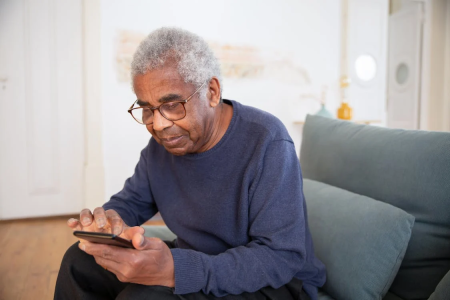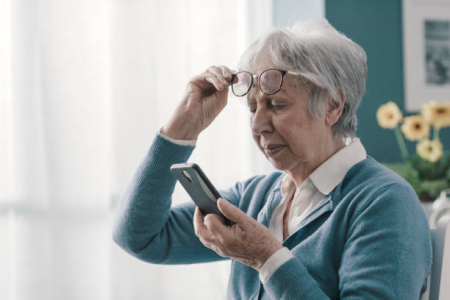Upcoming 3G network shutdown raises concerns for elderly reliant on medical alarms
By
- Replies 16
As we navigate the ever-evolving landscape of technology, it's crucial to stay informed about changes that could impact our daily lives—especially when it comes to our health and safety.
This is especially important for our senior community as we face a major technological transition: the shutdown of the 3G network in Australia.
This change affects more than just mobile phones; it has significant implications for individuals relying on 3G personal medical alarms.
With the 3G network set to be turned off at the end of August, tens of thousands of elderly may be left vulnerable, as many are still using medical alarms that rely on this soon-to-be-obsolete technology.
These devices are lifelines, monitoring for sudden movements such as falls and alerting emergency contacts. But once the 3G network is gone, these alarms will become ineffective.
The situation is alarming, and companies like CareAlert SmartDialler are scrambling to reach out to customers with older models to warn them of the impending risk.
‘We’re using a lot of resources at the moment trying to contact these people, but it’s not easy,’ Darren Steele from CareAlert said.
‘We’re trying everything to reach out to these people—emailing, SMSing, sending letters, trying to ring, but you’re dealing with the elderly, and they just don’t get it,’ he added.
Mr Steele added: ‘Just our business alone, we would have probably 3000 3G units out there at the moment that are going to stop working,’
CareAlert is one of around 10 prominent providers of medical alarm systems in Australia, and Mr Steele indicated that other companies were encountering similar issues.
‘You’re looking at 30,000 to 40,000 people that would still have a 3G alarm,’ he said, making a rough calculation.
‘They’re not tech-savvy enough to understand what 3G is and what 4G is.’
Mr Steele noted that his company initiated efforts to reach out to customers for upgrading to 4G last year.
‘We’ve recently ramped it up now because we’re not getting the response that we really want,’ he said.
The transition to 4G for CareAlert has completed approximately 1000 upgrades thus far.
Mr Steele claimed that even when customers are contacted, many struggle to afford the $399 cost.
‘Their unit’s working at the moment, “I’m not going to spend money to upgrade.” If they’re on the pension, they may not have money to upgrade,’ Steele explained.
‘Some of the responses are, “I can’t afford this; I don’t have access to government funding to be able to do it, so I don’t know what I’m going to do.”’
‘We are upgrading a lot where people do have access to government funding through My Aged Care; we’re doing a lot of that through the providers,’ Mr Steel continued.
Meanwhile, a spokesperson for another medical alarm provider, preferring not to disclose the company's name, stated that they have few or no 3G units on the market and have made preparations for the network switch-off.
Despite the differing perspectives, Steele affirmed that the situation presents a significant risk.
He estimated that CareAlert, offering both monitored and unmonitored devices, would experience around 540 activations combined each month.
'Basically, what it means is that the day they flip that switch [to turn off the 3G network], a medical alarm will not be able to make a call out at all, not even to triple-zero, nothing,’ Mr Steel said.
‘If you’ve got an elderly person that relies on one of these alarms, then suddenly it stops working, and they have a fall; they could be lying on the ground.’
‘They can’t get to their phone, they might be pushing their button on their alert system, and it will just not go anywhere. It’s a pretty major problem. It’s life-threatening, really,’ he added.
He further mentioned that Optus, the 3G network utilised by his company, has been offering assistance.
It was reported that the telecom company does not maintain customer relationships or contact information for individuals who possess any 3G-enabled devices.
However, Optus has communicated with medical alert providers regarding the impact on their services, urging them to directly reach out to the customers.
On the other hand, a Telstra spokesman explained there was a 'wide range of equipment in use across Australia that uses mobile technology and is sold or provided directly by third parties to their customers'.
'In relation to healthcare and emergency response devices, the vast majority of them are not able to be identified by mobile service providers as being personal medical alarms as they often share the same radio module technology as EFTPOS machines, telematics, security, or tracking devices,' he continued.
‘Since Telstra announced in 2019 that we will be closing our 3G network, we have worked closely with relevant industry organisations, manufacturers, and suppliers to ensure that they’re aware of the upcoming closure so they can let their communities and customers know if they have an impacted device.’ the Telstra spokesman said.
He also urged users of personal alarms to verify whether their devices rely on the 3G network by contacting their supplier or organisation.
Apart from numerous older mobile phones still in operation, countless other 3G devices— unnoticed in businesses, households, and farms—are at risk of suddenly becoming non-functional.
All three major Australian telcos made the industry-wide decision to shut down the 20-year-old 3G network, aiming to enhance capacity for newer networks.
Vodafone had already closed its 3G network in January.
Delays in the switch-off, like Telstra's recent extension to the end of August, aim to provide customers with more time to upgrade devices.
This move, while technologically progressive, comes with a hefty price tag for those needing to upgrade equipment—a cost that is particularly burdensome for seniors who are on a fixed income.
However, there is a positive aspect to this situation. Vodafone, Telstra, and Optus have valid reasons for completely phasing out 3G by the end of this year.
For our readers, it's crucial to act now. If you or a loved one relies on a personal medical alarm, or if you have any other device that may be affected by the 3G switch-off, please reach out to your supplier or service provider immediately to ensure continuity of service.
Don't wait until it's too late—take the necessary steps to protect your health and maintain peace of mind.
 Members, do you have a medical alarm or other 3G devices? Have you upgraded them? Please share your experiences and insights below.
Members, do you have a medical alarm or other 3G devices? Have you upgraded them? Please share your experiences and insights below.
This is especially important for our senior community as we face a major technological transition: the shutdown of the 3G network in Australia.
This change affects more than just mobile phones; it has significant implications for individuals relying on 3G personal medical alarms.
With the 3G network set to be turned off at the end of August, tens of thousands of elderly may be left vulnerable, as many are still using medical alarms that rely on this soon-to-be-obsolete technology.
These devices are lifelines, monitoring for sudden movements such as falls and alerting emergency contacts. But once the 3G network is gone, these alarms will become ineffective.
The situation is alarming, and companies like CareAlert SmartDialler are scrambling to reach out to customers with older models to warn them of the impending risk.
‘We’re using a lot of resources at the moment trying to contact these people, but it’s not easy,’ Darren Steele from CareAlert said.
‘We’re trying everything to reach out to these people—emailing, SMSing, sending letters, trying to ring, but you’re dealing with the elderly, and they just don’t get it,’ he added.
Mr Steele added: ‘Just our business alone, we would have probably 3000 3G units out there at the moment that are going to stop working,’
CareAlert is one of around 10 prominent providers of medical alarm systems in Australia, and Mr Steele indicated that other companies were encountering similar issues.
‘You’re looking at 30,000 to 40,000 people that would still have a 3G alarm,’ he said, making a rough calculation.
‘They’re not tech-savvy enough to understand what 3G is and what 4G is.’
Mr Steele noted that his company initiated efforts to reach out to customers for upgrading to 4G last year.
‘We’ve recently ramped it up now because we’re not getting the response that we really want,’ he said.
The transition to 4G for CareAlert has completed approximately 1000 upgrades thus far.
Mr Steele claimed that even when customers are contacted, many struggle to afford the $399 cost.
‘Their unit’s working at the moment, “I’m not going to spend money to upgrade.” If they’re on the pension, they may not have money to upgrade,’ Steele explained.
‘Some of the responses are, “I can’t afford this; I don’t have access to government funding to be able to do it, so I don’t know what I’m going to do.”’
‘We are upgrading a lot where people do have access to government funding through My Aged Care; we’re doing a lot of that through the providers,’ Mr Steel continued.
Meanwhile, a spokesperson for another medical alarm provider, preferring not to disclose the company's name, stated that they have few or no 3G units on the market and have made preparations for the network switch-off.
Despite the differing perspectives, Steele affirmed that the situation presents a significant risk.
He estimated that CareAlert, offering both monitored and unmonitored devices, would experience around 540 activations combined each month.
'Basically, what it means is that the day they flip that switch [to turn off the 3G network], a medical alarm will not be able to make a call out at all, not even to triple-zero, nothing,’ Mr Steel said.
‘If you’ve got an elderly person that relies on one of these alarms, then suddenly it stops working, and they have a fall; they could be lying on the ground.’
‘They can’t get to their phone, they might be pushing their button on their alert system, and it will just not go anywhere. It’s a pretty major problem. It’s life-threatening, really,’ he added.
He further mentioned that Optus, the 3G network utilised by his company, has been offering assistance.
It was reported that the telecom company does not maintain customer relationships or contact information for individuals who possess any 3G-enabled devices.
However, Optus has communicated with medical alert providers regarding the impact on their services, urging them to directly reach out to the customers.
On the other hand, a Telstra spokesman explained there was a 'wide range of equipment in use across Australia that uses mobile technology and is sold or provided directly by third parties to their customers'.
'In relation to healthcare and emergency response devices, the vast majority of them are not able to be identified by mobile service providers as being personal medical alarms as they often share the same radio module technology as EFTPOS machines, telematics, security, or tracking devices,' he continued.
‘Since Telstra announced in 2019 that we will be closing our 3G network, we have worked closely with relevant industry organisations, manufacturers, and suppliers to ensure that they’re aware of the upcoming closure so they can let their communities and customers know if they have an impacted device.’ the Telstra spokesman said.
He also urged users of personal alarms to verify whether their devices rely on the 3G network by contacting their supplier or organisation.
Apart from numerous older mobile phones still in operation, countless other 3G devices— unnoticed in businesses, households, and farms—are at risk of suddenly becoming non-functional.
All three major Australian telcos made the industry-wide decision to shut down the 20-year-old 3G network, aiming to enhance capacity for newer networks.
Vodafone had already closed its 3G network in January.
Delays in the switch-off, like Telstra's recent extension to the end of August, aim to provide customers with more time to upgrade devices.
This move, while technologically progressive, comes with a hefty price tag for those needing to upgrade equipment—a cost that is particularly burdensome for seniors who are on a fixed income.
However, there is a positive aspect to this situation. Vodafone, Telstra, and Optus have valid reasons for completely phasing out 3G by the end of this year.
For our readers, it's crucial to act now. If you or a loved one relies on a personal medical alarm, or if you have any other device that may be affected by the 3G switch-off, please reach out to your supplier or service provider immediately to ensure continuity of service.
Don't wait until it's too late—take the necessary steps to protect your health and maintain peace of mind.
Key Takeaways
- Tens of thousands of elderly may still be using 3G personal medical alarms which will stop working when the 3G network is shut down at the end of August.
- CareAlert SmartDialler and other suppliers are struggling to contact users of these devices, many of whom may not be tech-savvy or able to afford the upgrade to newer 4G models.
- The 3G network shutdown will affect not only personal medical alarms but also a range of other devices embedded in businesses and homes.
- Telstra and Optus have been working to inform affected customers and the industry about the 3G switch-off, while communication from the government highlights that this is a commercial decision by the mobile operators to facilitate the deployment of better technology like 4G and 5G.










